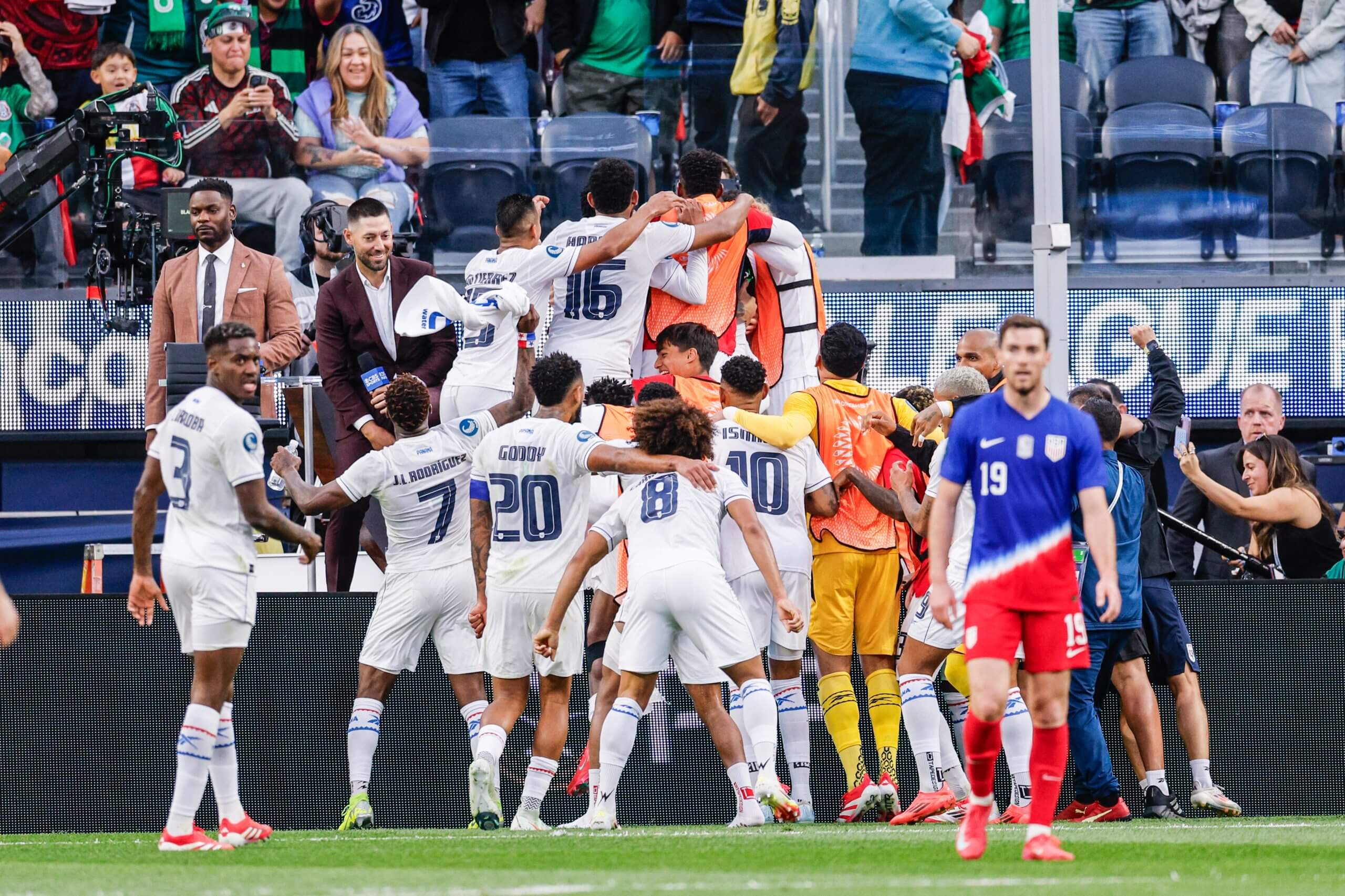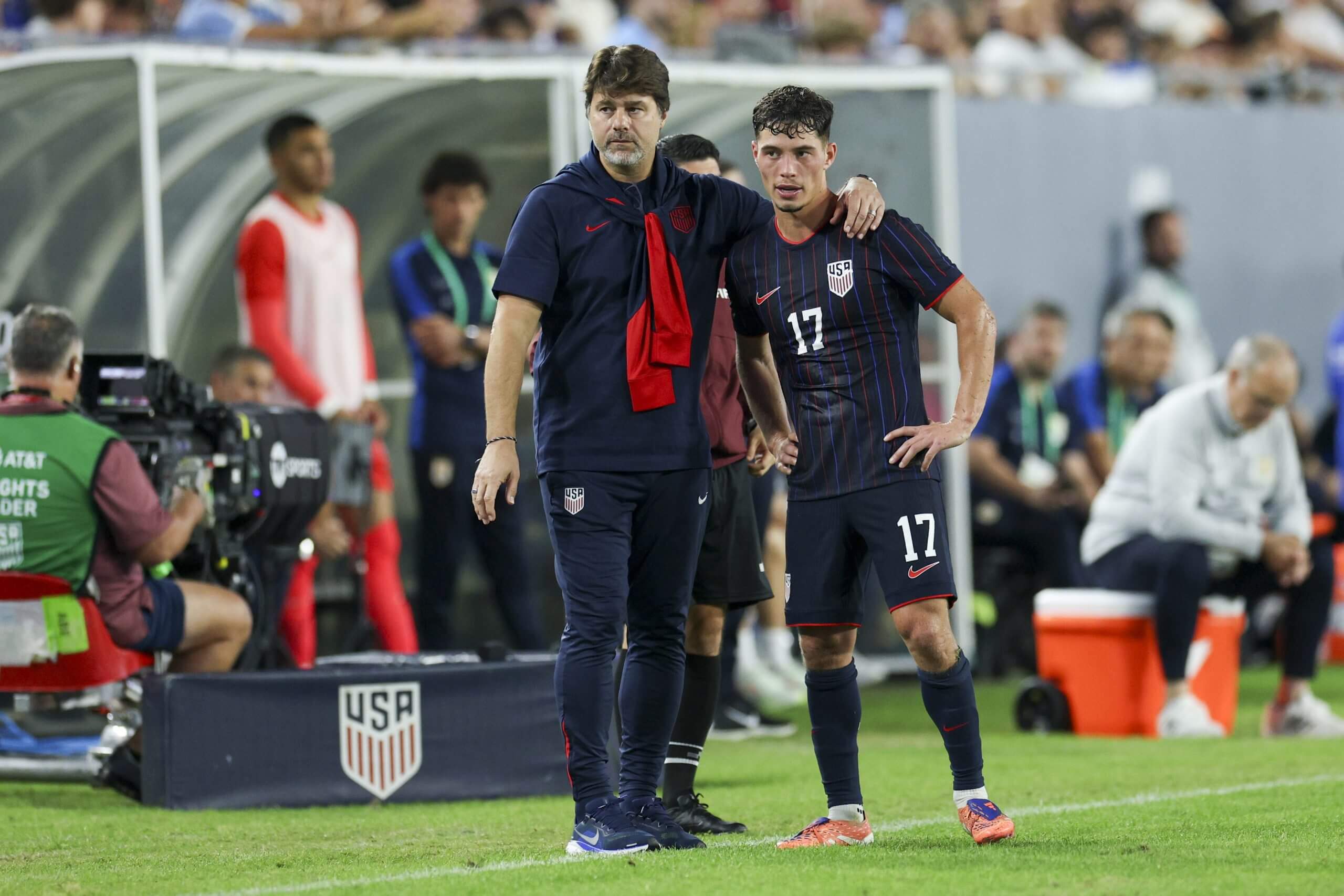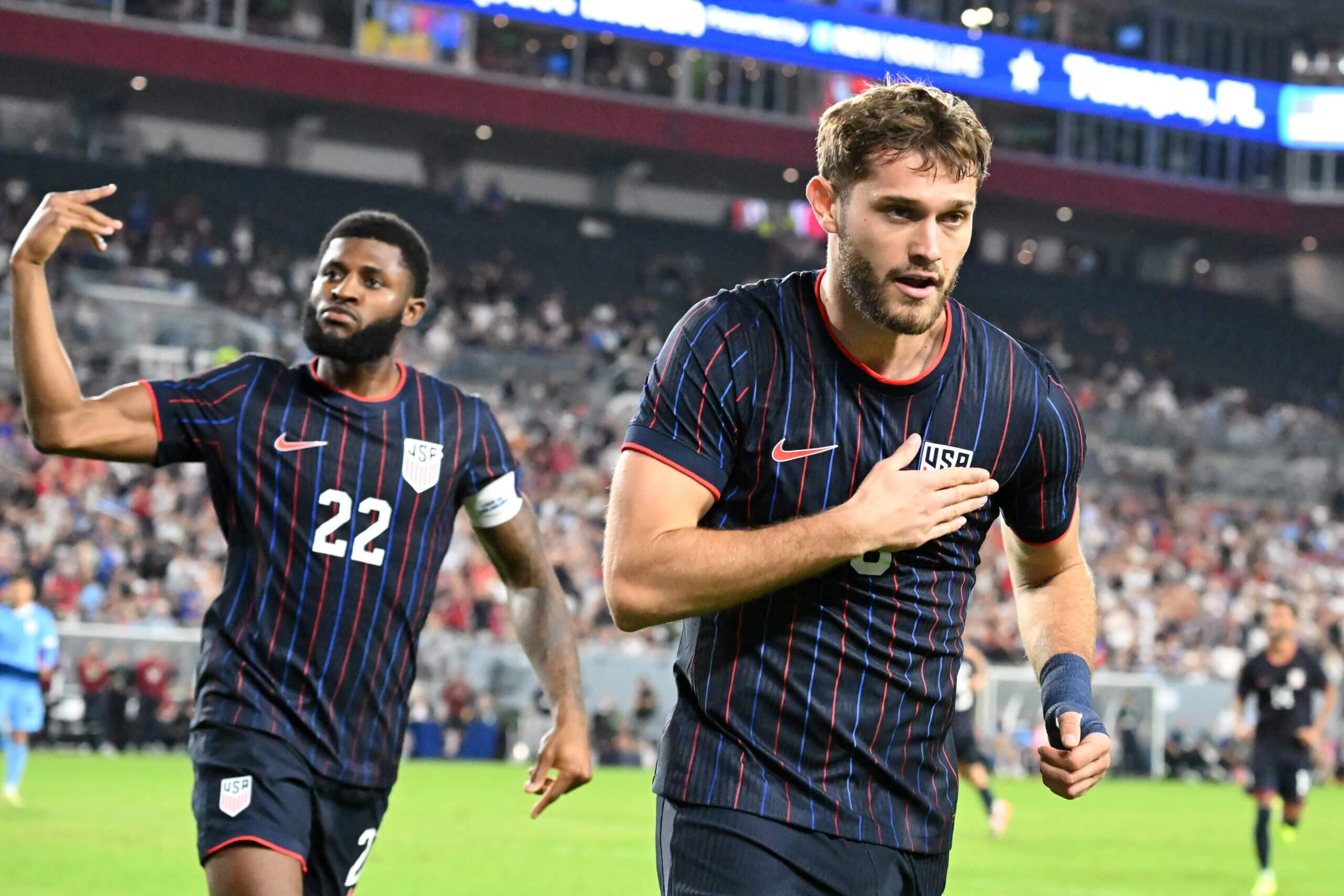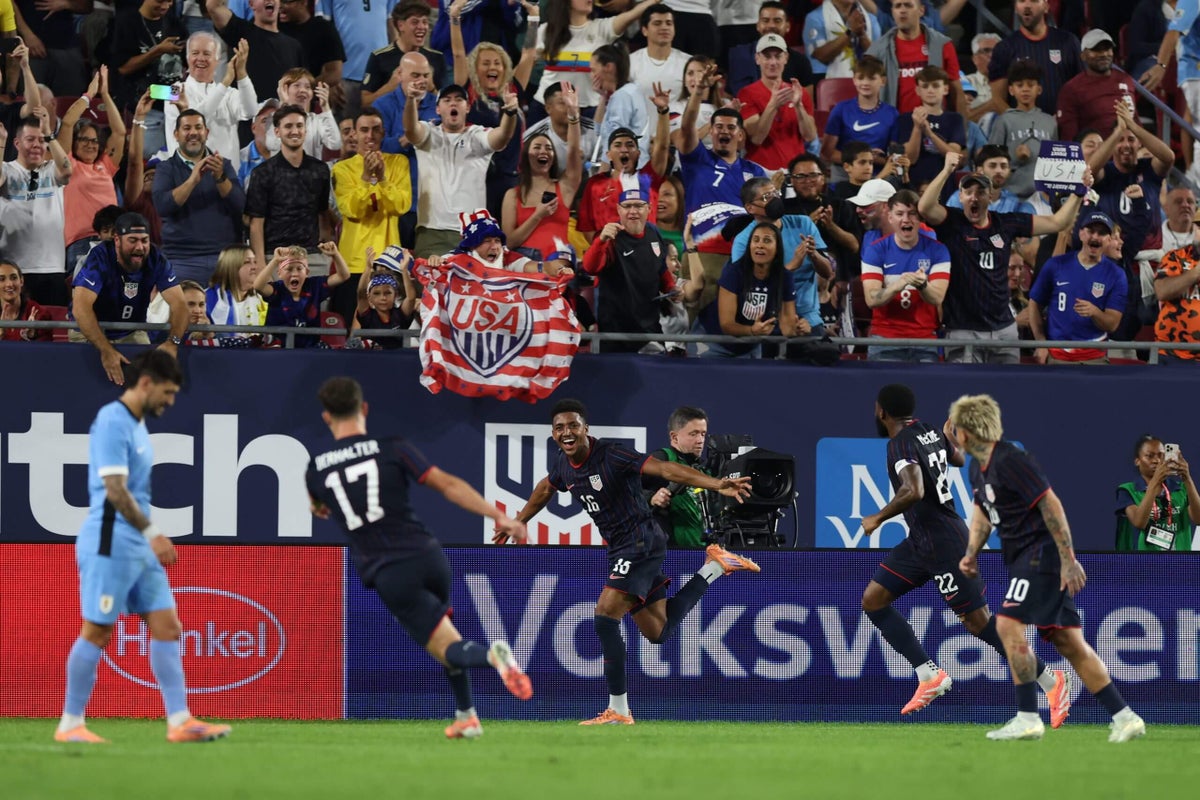TAMPA, Fla. — It feels like a lifetime ago, but it was just June 10 that a heavily-rotated U.S. men’s national team squad was played off the field against Switzerland.
So when Mauricio Pochettino named a starting lineup for Tuesday night’s friendly against Uruguay that featured nine new starters from the team that beat Paraguay three days before, it was understandable why some might have braced for a similar outcome. Uruguay, after all, was probably the most talented team the U.S. had seen since South Korea in September — and was playing some of its most important players.
Instead, the U.S. overwhelmed and steamrolled Uruguay at Raymond James Stadium, scoring three goals in the first 30 minutes en route to a decisive and signature 5-1 victory.
It spoke to the sheer amount of progress Pochettino had made in a short time with this U.S. team, not just in building out depth in the pool, but in building belief within that expanded pool of players. That he could field one team that looked like by far the better side against Paraguay, then change out so many players and get an even more impressive performance was a testament to that progress.
After the game, Pochettino’s press conference started with a surprisingly combative and fiery response to a question about what it meant to get such a positive result despite, “a lot of regulars rested.” Pochettino took it as an attack on the identity he was trying to build in the team; the identity that the result in question was meant to reinforce.
“I don’t want to be negative, no, but I hate the ‘no regular players’ (question). What does this mean? It’s (the) USA playing, it’s the national team,” he said. “Stop with that mindset. Every time our decision to pick a starting XI, it’s the U.S. men’s national team playing. If you know me, I hate to talk this way. It’s so disrespectful. We need to give credit to all of the guys.”
The focus on that word — ”regulars” — cut to the core of what Pochettino feels he has had to overcome. It has been a theme of his for months now. He has worked to cut the legs out from any sort of complacency or entitlement within the group. And to change the mentality outside of the group, as well. The talk about a “golden generation” had to end.
It was a journey that he said truly started after March’s Nations League, when losses to Panama and Canada sent this U.S. team reeling, but one he hopes ends with this team taking its chance and making a dream run to the decisive stages of next summer’s World Cup.
The defeats to the pair of Concacaf rivals in March’s Nations League felt like a sobering moment for a U.S. team that may have been hoping that changing the coach would be like pushing a fix-it button.
There had been so much hope and optimism around the U.S. team going into the 2024 Copa América only for them to fall in the group stage. After firing Gregg Berhalter and hiring Pochettino, the belief was that things would get back on track immediately.
The problems ran deeper than that. Pochettino felt the focus wasn’t there in camp. He could sense contentment and laxity.
“I think that March (was the turning point). I think with all that negativity, (comes) positive things, because with all this negativity we used (it) to build that journey,” Pochettino said. “Sometimes this type of thing can happen, for changing things. Maybe you see things in a different way. Sometimes our perception, sometimes can be wrong. Even being inside. And that I think when the reality touch, I think that’s important.”

A turning point for Mauricio Pochettino’s USMNT: defeat to Panama in the Concacaf Nations League semifinals in March 2025 (Kevork Djansezian / USSF / Getty Images)
It was, in other words, a moment for the U.S. team to come back down to reality.
Whatever the U.S. and its players thought they were — it wasn’t and they weren’t that. If Pochettino was going to change the mentality of the group, he was going to have to manufacture competition that hadn’t existed to a high enough degree in the first years of this cycle.
The ensuing months were spent breaking things down and building them back up again.
“I think that was good for us to see the reality,” Pochettino said. “When you really touch the reality, and it’s not the reality that you perceive, or you were convinced was different, I think this is a good point to be.”
The revamp started in the Gold Cup camp with players who mostly had everything to prove.
Going into the Gold Cup, the absence of players like Christian Pulisic, Weston McKennie, Tim Weah and Yunus Musah – “regulars,” if you will, even though Pochettino won’t – opened the door for others to step through. Pochettino leaned into the opportunity. He threw the players onto the field and challenged them to prove they belonged.
Even after the Switzerland loss, Pochettino didn’t lose faith in the group he believed could deliver an important message: that there was more talent in this U.S. pool than was being given credit. They just needed the chance. While just two players — Mark McKenzie and Sebastian Berhalter — were in the starting lineup for both the Switzerland loss and Uruguay triumph, a number of other players who featured in two big wins this window were a part of that game, against the Swiss, including Max Arfsten, John Tolkin, Diego Luna, Tim Ream and Brenden Aaronson.
Other players, like Malik Tillman, Matt Freese and Alex Freeman turned the Gold Cup — where the U.S. made a run to the final before falling to Mexico — into important jobs with the U.S.

Mauricio Pochettino puts his arm around Sebastian Berhalter during Tuesday’s rout of Uruguay (Nathan Ray Seebeck / Imagn Images)
“We know exactly the big group of players that we can rely on,” Pochettino’s assistant Jesús Pérez said. “Depending on the circumstances, now it’s a matter of state and injuries. But we know (for example), if we call Alex Freeman, what Alex can give us. When we gave him the opportunity, we saw the potential. And now (he is) just getting better for the national team, for his club.”
It was, Pochettino said, simply a matter of providing the platform and the belief.
The results weren’t perfect. But the tournament was less about the results and more about building a different mentality within the pool at large: No one’s job was secured. Everyone had a chance to book a ticket to the World Cup.
“At the end of the day, the principles of the games are there. … But none of them are going to be right if you are not fully committed,” Pérez said. “Fully committed with no doubts. And that’s the basics. So before we talk (about) other things, we [must] feel that we have a group really committed. And if (there) was some noise around those circumstances, I think everything (is now) clear.”
And it was that clarity — that commitment — that Pochettino felt he had to defend after the decisive victory that closed out 2025 on an enormously positive note for this U.S. team.
On Tuesday night, it was some of the new faces that emerged over the last few months that reignited belief that this U.S. team might be capable of making noise at next summer’s World Cup.
Berhalter stung a beautiful finish into the upper corner to start the scoring. Freeman netted the next two. Luna added the fourth.
This is what Pochettino aimed for when he built out his Gold Cup roster. Whether it was Pulisic, McKennie and Weah, or Berhalter, Freeman and Luna, Pochettino was convinced the results could be the same. And that the belief in the team should be the same, too. There are no regulars.
In part because of that depth that has been built out, the U.S. is unbeaten in its last five games against FIFA top-40 opponents for the first time since 2013. It feels like a completely different world than it did less than half a year ago.
“It’s a testament to the culture that we’re building,” McKenzie said. “It shows, again, the faith that Mauricio has in this team and that the collective have in one another. We’re building something special. We have a real brotherhood, a band of guys who are going to go out there and not only play with pride to represent our country, but play for the guys next to us.”
It has been a steady drumbeat of positivity around this U.S. team since it downed Japan in September. Players have looked more confident on the field. There seems to be a strong understanding of how they want to play and what the staff is looking for in the team’s approach to games. There has also been less concern or talk about intensity or desire. The complacency that Pochettino was combatting is gone.

Tanner Tessmann celebrates his goal for USA vs Uruguay, with Mark McKenzie joining in (Howard Smith / ISI Photos / USSF / Getty Images)
Two days before taking the field against Uruguay, Pochettino weaponized the idea of “reality” differently. He could sense the confidence building in front of him. In camp, Pochettino contrasted this team to what it looked like in March, calling it the epitome of “professional.” There was no “silly or stupid” things that happened away from the field.
“The focus, the concentration to perform, to train, to do everything that we propose (was there),” he said.
The reality now, he said, is better than what we might even think. And it’s forever away from where it was in March. Sensing that change, in a meeting with the team on Sunday, he reintroduced the goals going into the World Cup.
“Let’s be realistic,” Pochettino told the team. “And do the impossible.”
It was about reaching for big goals again. To compete against the best. The team’s reality could again be linked to its ambition.
With their heads now out of the clouds, and with the results coming and things clicking on and off the field, the focus could start to once again shift toward next summer and the task at hand. This U.S. team has a chance to do something special in the biggest sports event of all time. To do so, it’ll have to make a run deep into the knockout phase — to the quarterfinals or semifinals. The type of performance that would galvanize the nation.
“We’re starting to feel the World Cup and the excitement,” Pochettino said. “I think it’s important for our fans, this type of victory and the result, because I think it’s to push them to really believe in the team. We never doubted, because we saw the quality of the players. It was only to trust in them and to give the possibility to find a way to perform, to behave in the way that we feel in football, what it means to be professional. In all the areas I think we need to improve, because we are very ambitious and we want to win. We want to challenge all the teams. … Of course, the World Cup is going to be different, but I think we need to prepare ourselves to be there and to and to really believe in our chance.”
The further this U.S. team goes in the World Cup, the greater the impact on the sport in this country. If it can continue to build the way it has over the last five months, then the influence of this team and the 2026 World Cup could be as transformational as people hope.

